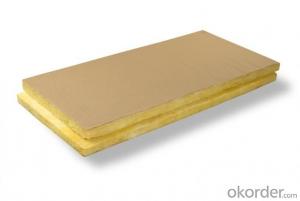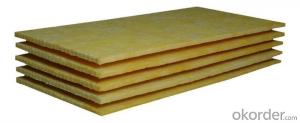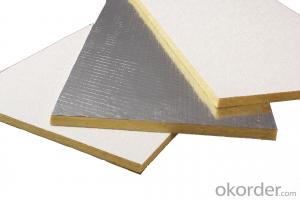Glass Wool Insulation Blanket With Kraft Facing
- Loading Port:
- Tianjin
- Payment Terms:
- TT OR LC
- Min Order Qty:
- 5000 m²
- Supply Capability:
- 20000 m²/month
OKorder Service Pledge
OKorder Financial Service
You Might Also Like
1.Description of Glass Wool Insulation Blanket With Kraft Facing:
At the system HOT END, the raw materials are dosed, mixed, melted, fiberized, impregnated with a special binder and formed into a primitive mat of very fine fiber glass. Continuous conveyors transport the mat to the COLD END of the plant for binder polymerization. The product is then cut to shape and packed for shipping.
Width: 0.4-1.2m
Length: 5-30m
Thickness: 25-200mm
Density: 10-50kg/m3
2.Main features of Glass Wool Blanket:
1.Excellent thermal, acoustical properties
2.Light weight and easy to fabricate on job site
3.Non-combustible and fire-retardant
4.Very economical, especially when using thick layers of insulation
5.Durable, life-time and termite proof
3.Glass Wool Blanket Images:
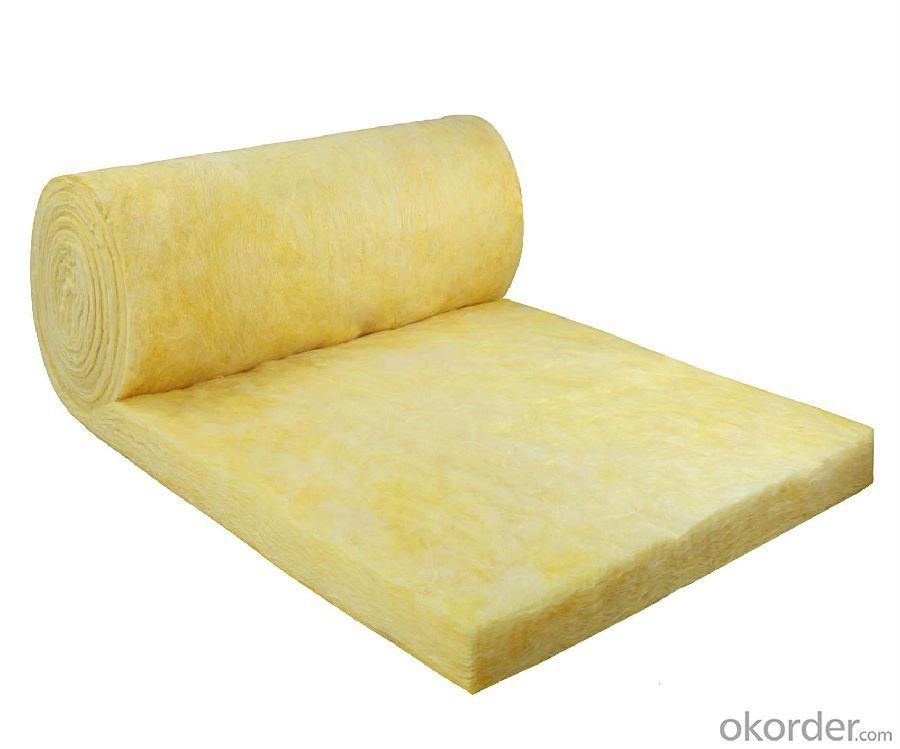
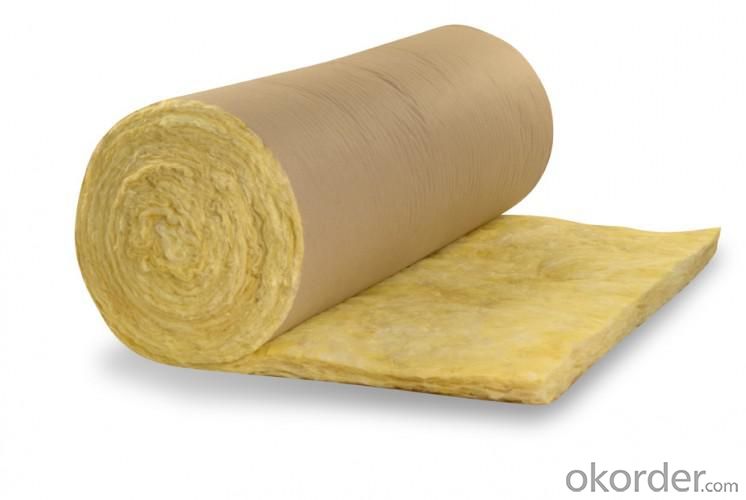
4. Glass Wool Insulation Blanket Technical Parameters:
Property | High/low temperature resistance, oil and fuel resistance, weathering resistance, O zone resistance etc. |
Shape | According to your requirement. |
Color | Any color is available ,according to your requirements. |
Material | NBR, CR, SBR, EPDM, IIR, NR, EP, Silicone, VITON etc. |
Hardness | 30-90ShoreA |
Delivery | In 10 days |
Packing | Plastic bag & carton box or according to your requirements. |
Application | Electronic field, industrial machine & equipment, house-hold appliance, telecommunication, automobile, medical equipment industry etc. |
5.FAQ
We have organized several common questions for our clients,may help you sincerely:
①How about your company?
A world class manufacturer & supplier of Glass Wool Blanket is one of the large scale professional investment casting production bases in China,consisting of both casting foundry forging and machining factory. Annually more than 8000 tons Precision casting and forging parts are exported to markets in Europe,America and Japan. OEM casting and forging service available according to customer’s requirement.
②How to guarantee the quality of the products?
We have established the international advanced quality management system every link from raw material to final product we have strict quality test; We resolutely put an end to unqualified products flowing into the market. At the same time, we will provide necessary follow-up service assurance.
- Q:What is the weathering resistance of fiberglass mat tissue?
- The weathering resistance of fiberglass mat tissue is generally considered to be high. Fiberglass mat tissue is made from a combination of fiberglass strands and a binder material, such as polyester or acrylic. This combination creates a strong and durable material that is resistant to various weathering factors, including exposure to sunlight, moisture, and temperature fluctuations. The fiberglass strands in the mat tissue provide excellent mechanical strength, preventing the material from breaking down under external stress or pressure. This strength helps the mat tissue withstand the impact of wind, rain, and other weather elements without significant damage. Additionally, the binder material used in the manufacturing process of fiberglass mat tissue is often formulated to be resistant to UV radiation. This UV resistance helps to protect the material from degradation and color fading caused by prolonged exposure to sunlight. It also helps to maintain the structural integrity and strength of the mat tissue over time. Furthermore, fiberglass mat tissue is also resistant to moisture and water absorption. This resistance prevents the material from becoming weakened or deteriorated when exposed to rain, humidity, or other moisture sources. As a result, the mat tissue remains intact and retains its performance properties even in wet or humid conditions. Overall, the weathering resistance of fiberglass mat tissue is considered to be excellent, making it a popular choice for various applications where durability and longevity in outdoor environments are required.
- Q:Can fiberglass mat tissue be used for thermal insulation?
- No, fiberglass mat tissue is not typically used for thermal insulation. It is primarily used for reinforcing and providing strength to composite materials such as fiberglass sheets or panels. For thermal insulation purposes, other materials such as mineral wool, foam, or cellulose insulation are commonly used.
- Q:Is fiberglass mat tissue suitable for insulation in food processing facilities?
- Fiberglass mat tissue is not suitable for insulation in food processing facilities. This material is typically used as a reinforcement in composites, such as roofing and construction materials, and is not designed to meet the specific requirements of food processing environments. Food processing facilities require insulation materials that are safe, durable, and compliant with strict health and safety regulations. Fiberglass mat tissue does not possess these characteristics and may pose potential risks to food safety. Instead, it is recommended to use insulation materials specifically designed for food processing facilities. These materials should be non-toxic, resistant to moisture, mold, and bacteria, and should be able to withstand high temperatures and frequent cleaning and sanitization procedures. Examples of suitable insulation materials for food processing facilities include closed-cell foam, mineral wool, and polyisocyanurate (PIR) foam. These materials have been extensively tested and proven to meet the necessary standards and regulations for use in food processing environments. It is crucial to prioritize the safety and hygiene of food processing facilities, and therefore, it is advisable to consult with experts or insulation specialists who can provide guidance on the most suitable and compliant insulation options for such facilities.
- Q:Does fiberglass mat tissue provide good fire protection?
- No, fiberglass mat tissue does not provide good fire protection.
- Q:How does the thickness of fiberglass mat tissue affect its performance?
- The thickness of fiberglass mat tissue plays a crucial role in determining its performance. Thicker fiberglass mat tissues generally provide better strength and durability compared to thinner ones. A thicker mat tissue allows for a higher resin-to-glass ratio, resulting in improved stiffness and toughness. This increased resin content enhances the overall structural integrity and mechanical properties of the fiberglass mat tissue. It also helps to minimize the risk of delamination and improves resistance to impact and fatigue. Moreover, thicker fiberglass mat tissues are more effective in providing thermal and acoustic insulation. The increased thickness allows for a higher density of fibers, which enhances the material's ability to trap air and reduce heat transfer or sound transmission. However, it is important to note that the specific application and requirements should be considered when determining the appropriate thickness of fiberglass mat tissue. While thicker tissues generally offer better performance, they may also be heavier and more expensive. Therefore, a balance must be struck between the desired performance characteristics and the practical considerations of weight, cost, and ease of installation.
- Q:How is fiberglass mat tissue used in the production of printed circuit boards?
- Fiberglass mat tissue is used as a reinforcement material in the production of printed circuit boards (PCBs). It is typically impregnated with epoxy resin and then laminated onto the copper-clad laminates. This helps to improve the mechanical strength and stability of the PCB, making it more resistant to bending, warping, and other forms of physical stress. Additionally, the fiberglass mat tissue provides insulation between the copper layers, preventing short circuits and enhancing the overall performance and reliability of the PCBs.
- Q:Can fiberglass mat tissue be used for repairing fiberglass RVs?
- Yes, fiberglass mat tissue can be used for repairing fiberglass RVs. Fiberglass mat tissue is a lightweight, flexible material that is commonly used for reinforcing and repairing fiberglass structures. It is designed to be easily molded and shaped to fit the contours of the damaged area, making it ideal for repairing RVs, which often have curved surfaces. To repair a fiberglass RV using fiberglass mat tissue, the damaged area needs to be cleaned and prepared by removing any loose or damaged fiberglass. The mat tissue is then cut to the appropriate size and shape to cover the damaged area. A suitable fiberglass resin or adhesive is applied to both the damaged area and the backside of the mat tissue. The tissue is then carefully placed over the damaged area and pressed down to ensure proper adhesion. Once the repair is complete, the fiberglass resin or adhesive is allowed to cure according to the manufacturer's instructions. After curing, the repaired area can be sanded, primed, and painted to match the rest of the RV's exterior. It is important to note that fiberglass mat tissue is typically used for smaller repairs and cosmetic damage. For larger structural repairs, it may be necessary to use additional reinforcement materials such as fiberglass cloth or woven roving. It is recommended to consult with a professional or refer to specific repair guides for detailed instructions on repairing fiberglass RVs.
- Q:Can fiberglass mat tissue be used for making decorative panels?
- Fiberglass mat tissue is a versatile material commonly used in construction and manufacturing industries. It consists of randomly oriented glass fibers bonded together with a binder, resulting in a strong and durable product suitable for various applications. For decorative panels, fiberglass mat tissue is an excellent option. It can be molded into different shapes and sizes, allowing for intricate and unique designs. The material is lightweight and easy to handle and install. Additionally, it has excellent dimensional stability, ensuring it won't warp or deform over time. Moreover, fiberglass mat tissue is highly resistant to moisture, chemicals, and UV radiation, making it suitable for both indoor and outdoor use. It can withstand harsh weather conditions without rotting or decaying. This durability ensures that decorative panels made from fiberglass mat tissue will maintain their appearance and functionality for an extended period. When it comes to finishing, fiberglass mat tissue can be easily painted or coated to achieve the desired aesthetic. It can also be laminated with other materials, such as wood veneer or decorative films, to enhance its visual appeal. This flexibility offers endless design possibilities, making fiberglass mat tissue an excellent choice for creating decorative panels. In conclusion, fiberglass mat tissue is a reliable material for making decorative panels. Its strength, durability, and versatility make it suitable for various indoor and outdoor applications. Whether you want to create unique designs or enhance the aesthetics of a space, fiberglass mat tissue provides the necessary qualities to achieve your desired outcome.
- Q:How does fiberglass mat tissue perform in terms of moisture absorption?
- Fiberglass mat tissue boasts exceptional moisture absorption capabilities. Its composition of fine fibers grants it a large surface area, allowing for swift moisture absorption. Moreover, fiberglass mat tissue exhibits hydrophobic properties, repelling water and preventing prolonged moisture retention. This attribute renders it an optimal material for moisture-resistant applications, including the construction of waterproofing membranes or the production of boats and water tanks. In sum, fiberglass mat tissue showcases remarkable performance in averting moisture absorption and upholding its structural integrity, even within damp surroundings.
- Q:What is the delamination strength of fiberglass mat tissue?
- The delamination strength of fiberglass mat tissue refers to its ability to resist the separation or detachment of layers within the material. This strength is dependent on various factors such as the quality of the resin used, the thickness and density of the mat, and the manufacturing process. Fiberglass mat tissue is typically designed to have a high delamination strength to ensure its durability and structural integrity. The mat is composed of multiple layers of glass fibers held together by a binder or resin. The bonding between these layers is crucial in preventing delamination. The delamination strength of fiberglass mat tissue can be determined through various testing methods, such as the peel test, where the force required to separate the layers is measured. This test provides valuable information about the adhesive strength between the layers and helps in assessing the overall quality of the material. The delamination strength can vary depending on the specific application and requirements. For example, fiberglass mat tissue used in construction or automotive industries may have different delamination strength specifications compared to those used in marine or aerospace applications. Manufacturers typically provide technical data or specifications indicating the delamination strength of their fiberglass mat tissue products. It is important to note that the delamination strength of fiberglass mat tissue can be influenced by external factors such as exposure to extreme temperatures, moisture, or chemical substances. Therefore, proper installation, maintenance, and adherence to recommended usage guidelines are essential to maintaining the desired delamination strength and overall performance of the material.
1. Manufacturer Overview |
|
|---|---|
| Location | |
| Year Established | |
| Annual Output Value | |
| Main Markets | |
| Company Certifications | |
2. Manufacturer Certificates |
|
|---|---|
| a) Certification Name | |
| Range | |
| Reference | |
| Validity Period | |
3. Manufacturer Capability |
|
|---|---|
| a)Trade Capacity | |
| Nearest Port | |
| Export Percentage | |
| No.of Employees in Trade Department | |
| Language Spoken: | |
| b)Factory Information | |
| Factory Size: | |
| No. of Production Lines | |
| Contract Manufacturing | |
| Product Price Range | |
Send your message to us
Glass Wool Insulation Blanket With Kraft Facing
- Loading Port:
- Tianjin
- Payment Terms:
- TT OR LC
- Min Order Qty:
- 5000 m²
- Supply Capability:
- 20000 m²/month
OKorder Service Pledge
OKorder Financial Service
Similar products
New products
Hot products
Hot Searches
Related keywords
